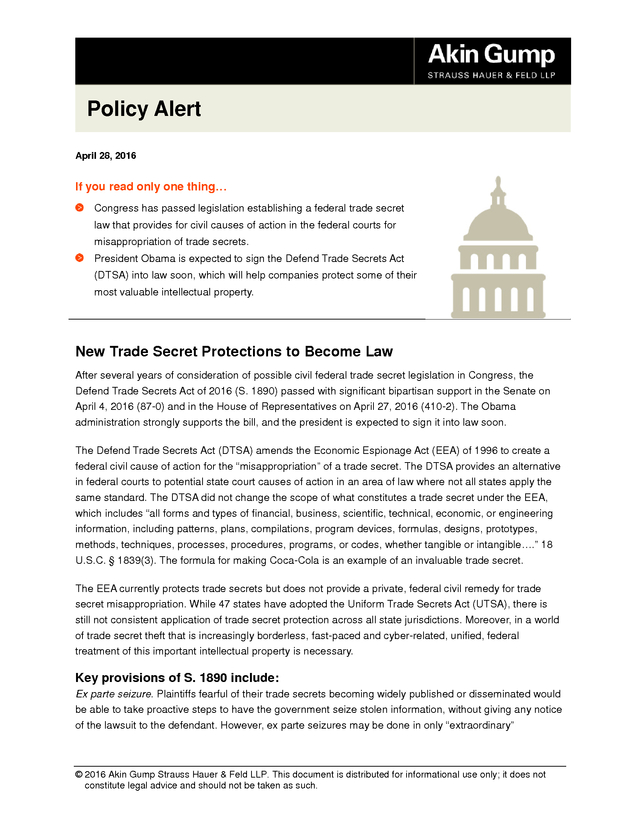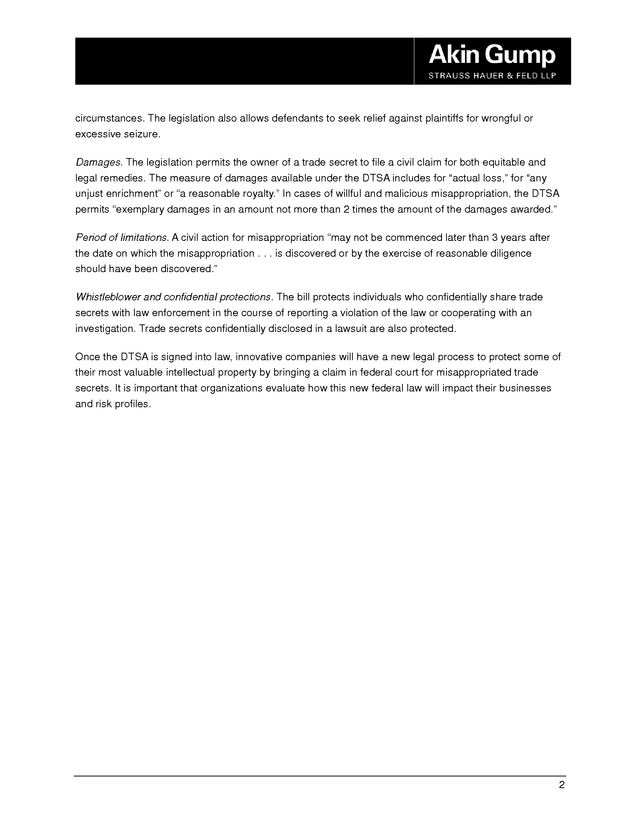Description
Policy Alert
April 28, 2016
If you read only one thing…
Congress has passed legislation establishing a federal trade secret
law that provides for civil causes of action in the federal courts for
misappropriation of trade secrets.
President Obama is expected to sign the Defend Trade Secrets Act
(DTSA) into law soon, which will help companies protect some of their
most valuable intellectual property.
New Trade Secret Protections to Become Law
After several years of consideration of possible civil federal trade secret legislation in Congress, the
Defend Trade Secrets Act of 2016 (S. 1890) passed with significant bipartisan support in the Senate on
April 4, 2016 (87-0) and in the House of Representatives on April 27, 2016 (410-2). The Obama
administration strongly supports the bill, and the president is expected to sign it into law soon.
The Defend Trade Secrets Act (DTSA) amends the Economic Espionage Act (EEA) of 1996 to create a
federal civil cause of action for the “misappropriation” of a trade secret. The DTSA provides an alternative
in federal courts to potential state court causes of action in an area of law where not all states apply the
same standard.
The DTSA did not change the scope of what constitutes a trade secret under the EEA, which includes “all forms and types of financial, business, scientific, technical, economic, or engineering information, including patterns, plans, compilations, program devices, formulas, designs, prototypes, methods, techniques, processes, procedures, programs, or codes, whether tangible or intangible….” 18 U.S.C. § 1839(3). The formula for making Coca-Cola is an example of an invaluable trade secret. The EEA currently protects trade secrets but does not provide a private, federal civil remedy for trade secret misappropriation.
While 47 states have adopted the Uniform Trade Secrets Act (UTSA), there is still not consistent application of trade secret protection across all state jurisdictions. Moreover, in a world of trade secret theft that is increasingly borderless, fast-paced and cyber-related, unified, federal treatment of this important intellectual property is necessary. Key provisions of S. 1890 include: Ex parte seizure.
Plaintiffs fearful of their trade secrets becoming widely published or disseminated would be able to take proactive steps to have the government seize stolen information, without giving any notice of the lawsuit to the defendant. However, ex parte seizures may be done in only “extraordinary” © 2016 Akin Gump Strauss Hauer & Feld LLP. This document is distributed for informational use only; it does not constitute legal advice and should not be taken as such. .
circumstances. The legislation also allows defendants to seek relief against plaintiffs for wrongful or excessive seizure. Damages. The legislation permits the owner of a trade secret to file a civil claim for both equitable and legal remedies. The measure of damages available under the DTSA includes for "actual loss,” for "any unjust enrichment” or “a reasonable royalty.” In cases of willful and malicious misappropriation, the DTSA permits “exemplary damages in an amount not more than 2 times the amount of the damages awarded.” Period of limitations.
A civil action for misappropriation “may not be commenced later than 3 years after the date on which the misappropriation . . .
is discovered or by the exercise of reasonable diligence should have been discovered.” Whistleblower and confidential protections. The bill protects individuals who confidentially share trade secrets with law enforcement in the course of reporting a violation of the law or cooperating with an investigation. Trade secrets confidentially disclosed in a lawsuit are also protected. Once the DTSA is signed into law, innovative companies will have a new legal process to protect some of their most valuable intellectual property by bringing a claim in federal court for misappropriated trade secrets.
It is important that organizations evaluate how this new federal law will impact their businesses and risk profiles. 2 . Contact Information If you have any questions regarding this alert, please contact: Chad Everingham Michael P. Kahn Ed Pagano Partner ceveringham@akingump.com +1 903.297.7404 Longview Partner mkahn@akingump.com +1 212.872.1082 New York Partner epagano@akingump.com +1 202.887.4255 Washington, D.C. Anthony T. Pierce Brian A. Pomper Michael Simons Partner apierce@akingump.com +1 202.887.4411 Washington, D.C. Partner bpomper@akingump.com +1 202.887.4134 Washington, D.C. Partner msimons@akingump.com +1 512.499.6253 Austin Valerie Morse White Matthew Weiss Taras Gach Consultant vwhite@akingump.com +1 202.887.4395 Washington, D.C. Law Clerk (not admitted to practice) mweiss@akingump.com +1 212.872.8065 New York Public Policy Specialist tgach@akingump.com +1 202.416.5162 Washington, D.C. 3 .
The DTSA did not change the scope of what constitutes a trade secret under the EEA, which includes “all forms and types of financial, business, scientific, technical, economic, or engineering information, including patterns, plans, compilations, program devices, formulas, designs, prototypes, methods, techniques, processes, procedures, programs, or codes, whether tangible or intangible….” 18 U.S.C. § 1839(3). The formula for making Coca-Cola is an example of an invaluable trade secret. The EEA currently protects trade secrets but does not provide a private, federal civil remedy for trade secret misappropriation.
While 47 states have adopted the Uniform Trade Secrets Act (UTSA), there is still not consistent application of trade secret protection across all state jurisdictions. Moreover, in a world of trade secret theft that is increasingly borderless, fast-paced and cyber-related, unified, federal treatment of this important intellectual property is necessary. Key provisions of S. 1890 include: Ex parte seizure.
Plaintiffs fearful of their trade secrets becoming widely published or disseminated would be able to take proactive steps to have the government seize stolen information, without giving any notice of the lawsuit to the defendant. However, ex parte seizures may be done in only “extraordinary” © 2016 Akin Gump Strauss Hauer & Feld LLP. This document is distributed for informational use only; it does not constitute legal advice and should not be taken as such. .
circumstances. The legislation also allows defendants to seek relief against plaintiffs for wrongful or excessive seizure. Damages. The legislation permits the owner of a trade secret to file a civil claim for both equitable and legal remedies. The measure of damages available under the DTSA includes for "actual loss,” for "any unjust enrichment” or “a reasonable royalty.” In cases of willful and malicious misappropriation, the DTSA permits “exemplary damages in an amount not more than 2 times the amount of the damages awarded.” Period of limitations.
A civil action for misappropriation “may not be commenced later than 3 years after the date on which the misappropriation . . .
is discovered or by the exercise of reasonable diligence should have been discovered.” Whistleblower and confidential protections. The bill protects individuals who confidentially share trade secrets with law enforcement in the course of reporting a violation of the law or cooperating with an investigation. Trade secrets confidentially disclosed in a lawsuit are also protected. Once the DTSA is signed into law, innovative companies will have a new legal process to protect some of their most valuable intellectual property by bringing a claim in federal court for misappropriated trade secrets.
It is important that organizations evaluate how this new federal law will impact their businesses and risk profiles. 2 . Contact Information If you have any questions regarding this alert, please contact: Chad Everingham Michael P. Kahn Ed Pagano Partner ceveringham@akingump.com +1 903.297.7404 Longview Partner mkahn@akingump.com +1 212.872.1082 New York Partner epagano@akingump.com +1 202.887.4255 Washington, D.C. Anthony T. Pierce Brian A. Pomper Michael Simons Partner apierce@akingump.com +1 202.887.4411 Washington, D.C. Partner bpomper@akingump.com +1 202.887.4134 Washington, D.C. Partner msimons@akingump.com +1 512.499.6253 Austin Valerie Morse White Matthew Weiss Taras Gach Consultant vwhite@akingump.com +1 202.887.4395 Washington, D.C. Law Clerk (not admitted to practice) mweiss@akingump.com +1 212.872.8065 New York Public Policy Specialist tgach@akingump.com +1 202.416.5162 Washington, D.C. 3 .















